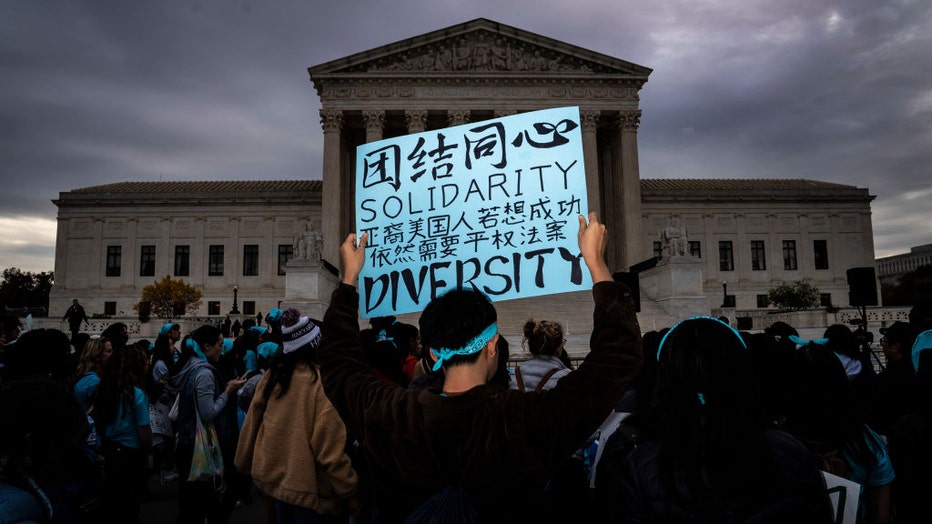Georgia's reaction to Supreme Court affirmative action ruling
Ruling impacts Georgia colleges
So what does this historic Supreme Court ruling mean for colleges and universities in Georgia? Experts say this decision is expected to have a big impact on colleges and universities like Georgia State, but the state’s university system claims it’s not going to have a real impact at all.
ATLANTA - After the U.S. Supreme Court effectively struck down the use of affirmative action in college admission decisions, FOX 5 got answers from experts and state leaders on how this may impact college and university admissions.
"I am a junior at Georgia State Honors College. I majored in criminal justice, a minor political science," said Jada Harris, a junior at Georgia State University.
Harris is the first in her family to go to college. Which is why she says Thursday’s Supreme Court decision was especially painful to her.
"I think, as a first-generation student and future law student, I think it was really upsetting, knowing that my race won’t help. Won’t give me an extra boost over people who had opportunities before me," Harris said.
She worries the 6-3 decision, which strikes down the use of affirmative action in college admissions, will hurt other first-generation minority students applying to college.
Fellow GSU student Zri Hitchcock shares her concerns.
"It’s unfortunate because the reality is that we need a remedying solution for those who have been under for a while, and we can’t get there if there are people in power, like the freaking Supreme Court, who are literally doing national bans and passing national bills to affect us," Hitchcock said.
"I don’t think anybody was particularly surprised that the Roberts Court decided that affirmative action was no longer constitutional," said Anthony Michael Kries, an assistant professor of law at GSU.
Supreme Court rules on affirmative action
The Supreme Court's ruling means colleges and universities can no longer use affirmative action in their admissions policies. The court had allowed race to be used as a factor in admissions for decades so long as a school didn't use quotas. However, Thursday the court specifically found that Harvard and the University of North Carolina at Chapel Hill had discriminated against white and Asian American applicants by using race-based admission policies in their attempts to promote diversity.
He says this could be a major headache for colleges trying to diversify their student bodies.
"It just really makes it exponentially harder for universities to track the racial demographics that they’re admitting…private institutions, public institutions will have to go back to the drawing board, decide what and if any way they want to use race, how they can use race consistent with today’s decision, and then adopt those policies going forward," Kries said.
However, Kries also says his reading of the majority opinion doesn’t forbid a student from using their relationship to race in their college application.
"The majority opinion today was very clear that race is not removed from the calculus completely. So, if a student or an applicant wanted to talk about how race affected their lives or how they were particularly courageous because of something that they overcame with respect to racial discrimination…the applicant can still volunteer that information and universities can still consider it," Kries said.
FOX 5 asked the University System of Georgia how this will impact college admissions in the state.
They responded with a statement:
"At all 26 University System of Georgia institutions, race or ethnicity is not a determining factor in admissions. USG follows the law with regards to the admission of students."
However, Harris, Hitchcock and other GSU students say they’re skeptical about that answer.
Harris worries it will even discourage first generation minority students from even applying.
"I just think it’s just going to give them another reason to not even consider it…knowing that the system is trying to prevent them from going further into their education," Harris said.

FILE - People rally in support of affirmative action in college admissions as arguments start on the cases at the Supreme Court on Capitol Hill on Oct. 31, 2022, in Washington, DC. (Photo by Jabin Botsford/The Washington Post via Getty Images)
Here are some of the other reactions from people within the state of Georgia.
Mayor Andre Dickens issued the following statement on the U.S. Supreme Court’s ruling on affirmative action.
"Today’s decision by the U.S. Supreme Court to end affirmative action programs at colleges and universities will have disastrous effects on families of color who are already grappling with upward economic mobility.
"Plainly put, they got it wrong and I am gravely concerned on what this means for a diverse workforce like ours in the city of Atlanta.
"A quality education is a powerful tool, and my Administration will continue to do its part to ensure every child in Atlanta has the support from their village needed to thrive—regardless of who they are. "
Congressman Hank Johnson (GA-04), Ranking Member of the House Judiciary Subcommittee on Courts, Intellectual Property, and the Internet, issued the following statement after the ultra-conservative supermajority on the Supreme Court threw out race-conscious admissions at universities across the country, eliminating decades of precedent.
"Justice ‘Harlan Crow’ Thomas and five other MAGAs have just slammed the college doors on Black and Brown folks after declaring that we now live in a color-blind country. This judicial activism must be met with passage of my legislation to expand SCOTUS. This decision can lead to the demise of HBCUs. We cannot let that happen. Supreme Court Reform Now!"
Martin Luther King Jr.'s youngest daughter, Bernice King, reacted on Twitter:
"We should not need #AffirmativeAction. But we do. Because racism, particularly anti-Black racism, persists in our systems, policies, and institutions. Until we change that, decision-makers must be made to make equitable decisions. The #SupremeCourt ruling prevents that mandate."

